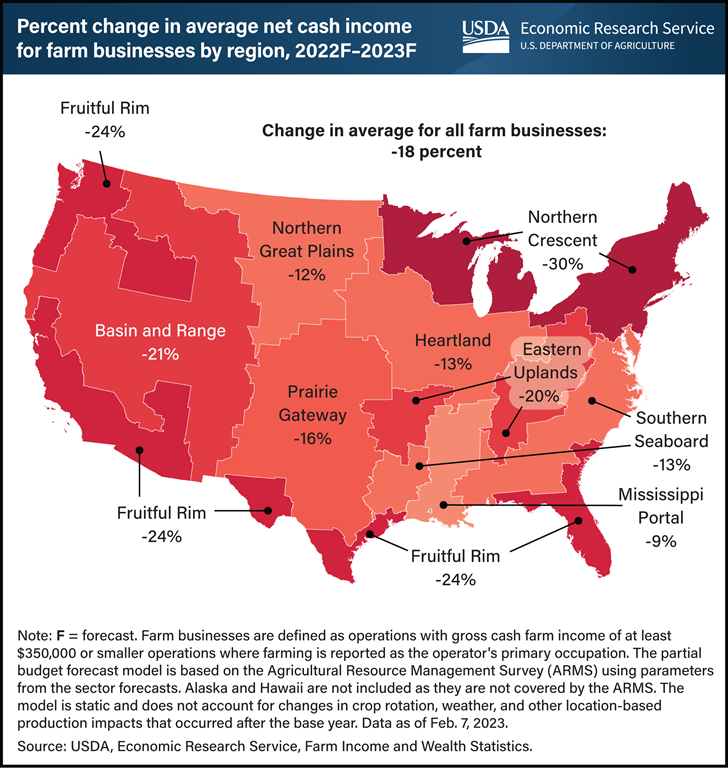|
News Bits
Brownfield Ag News reports:
U.S. farmers made solid progress planting corn and soybeans last week. That was despite rain in some key growing areas, with more in the forecast for parts of the Midwest and Plains this week.
The USDA says 49% of U.S. corn is planted, compared to 26% a week ago and the five-year average of 42%, with 12% emerged, compared to 11% on average.
35% of soybeans are planted as of Sunday, compared to 19% last week and 21% on average, with 9% emerged, compared to 4% typically in early May.
29% of the winter wheat crop is in good to excellent condition, 1% above the previous week and matching a year ago, and 38% has headed, compared to 35% on average.
24% of spring wheat is planted, compared to 38% normally this time of year due to wet weather in the northern Plains, with 5% emerged, compared to 11% on average.
22% of cotton is planted, compared to the five-year average of 23%.
72% of rice is planted and 55% has emerged, both solidly ahead of their usual respective paces.
24% of sorghum has been planted, matching the typical rate.
33% of U.S. pastures and rangelands are in good to excellent shape, 11% above the first rating of 2022.
Canada is so far taking an "observer" role as the U.S. confronts Mexico over its ban on genetically modified white corn, but Agriculture Minister Marie-Claude Bibeau tells Agri-Pulse she's backing the U.S. argument that Mexico doesn't have science on its side.
"It's not a matter of how (food) has been produced," she said in an interview Tuesday. "It's a matter of what the result is. And when our scientists agree that it's safe, then there should not be trade barriers."
There is also the issue of a potential domino effect, with other countries attempting to copy Mexico's unscientific trade barriers, said Bibeau, who added, "Where will it end?"
Agriculture Secretary Tom Vilsack today announced that the U.S. Department of Agriculture (USDA) is taking additional steps as part of its commitment to strengthen the market for domestically grown organic goods, and to support producers seeking organic certification. These funding opportunities are part of the U.S. Department of Agriculture's (USDA) Organic Transition Initiative, launched in fall 2022, which is a suite of offerings to help existing organic farmers and those transitioning to organic production and processing.
"As USDA works to help make our nation's food system more resilient and create more options for producers and consumers, we recognize the important role the organic industry can play in expanding opportunities for value-added agriculture, strengthening supply chains and generating revenue for farmers," Vilsack said. "For many farmers, the transition period before attaining organic certification can be cost-prohibitive, so USDA is also helping mitigate the risk involved for farmers who want to be able to grow and market organic crops."
Editor's Note: Will someone please explain to us why transitioning to organic production makes our food supply "more resilient?" And what justification there is for spending tax dollars on this?
The record for most lifetime milk produced by a registered Holstein cow has been broken once again in 2023. This time by Nor-Bert Colby Connie, a 14-year-old Holstein owned by Nor-Bert Farm in Bremen, Indiana.
Connie achieved this incredible feat with her lifetime milk production record of 486,300 pounds through her latest completed lactation, surpassing the previous record holder's, Chrome-View Charles 3044, 478,200 pounds of lifetime milk (56,547 gallons of milk).
Connie has equally impressive numbers for components, with a lifetime record of 27,062 pounds of fat and 17,737 pounds of protein through her last completed lactation. These tremendous fat and protein totals are currently the highest lifetime totals for fat and protein in the Holstein Association USA database. Chrome-View Charles 3044's components stood at 14,447 pounds of fat, and 12,576 pounds of protein.
|
 USDA FORECASTS FARM INCOME TO FALL 18%
USDA FORECASTS FARM INCOME TO FALL 18% USDA FORECASTS FARM INCOME TO FALL 18%
USDA FORECASTS FARM INCOME TO FALL 18%